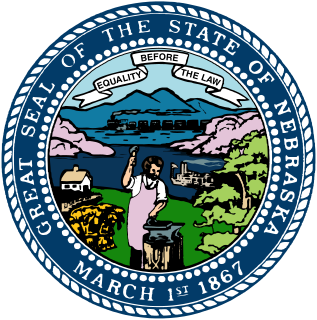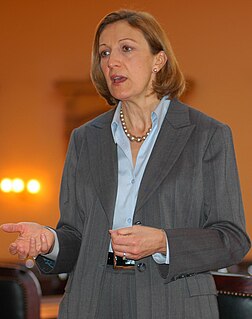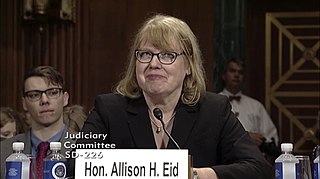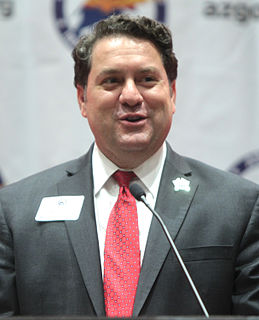Related Research Articles

Rose Elizabeth Bird was the 25th Chief Justice of the California Supreme Court. Her career was marked by firsts. She was the first female clerk of the Nevada Supreme Court,the first female deputy public defender in Santa Clara County,the first woman to serve in the California State Cabinet,and the first female Chief Justice of California.

The Supreme Court of Texas (SCOTX) is the court of last resort for civil matters in the U.S. state of Texas. A different court,the Texas Court of Criminal Appeals (CCA),is the court of last resort in criminal matters.

The Nebraska Supreme Court is the highest court in the U.S. state of Nebraska. The court consists of a chief justice and six associate justices. Each justice is initially appointed by the governor of Nebraska;using the Missouri Plan,each justice is then subject to a retention vote for additional six-year terms. The six justices each represent a Supreme Court district;the chief justice is appointed at-large.
The Tennessee Plan is a system used to appoint and elect appellate court judges in Tennessee. It is largely patterned after the Missouri Plan,and an earlier version in Tennessee was called the Modified Missouri Plan. At the next general election following a judicial appointment to the highest courts,and at the end of every eight-year term,voters' input occurs by deciding whether each judge shall be retained through a yes-no retention election.

Lorna Elizabeth Lockwood was an American lawyer and judge who served as justice of the Arizona Supreme Court.

Jennifer Lee Brunner is an American attorney,politician and judge. She is currently an associate justice of the Ohio Supreme Court,a position to which she was elected after serving as a judge on Ohio's Tenth District Court of Appeals. On June 8,2021,Brunner announced her candidacy for Chief Justice of the Ohio Supreme Court in the November 8,2022,general election. Brunner is a member of the Democratic Party who served as the Ohio Secretary of State;Brunner was the first woman to serve in this capacity. She took office after sixteen years of Republican control,which included two four-year terms by her predecessor J. Kenneth Blackwell,who oversaw the 2000 and 2004 United States elections. Brunner served only a single term as Secretary of State. When it came time for re-election in 2010,she instead made an unsuccessful bid for the U.S. Senate. Prior to being elected Secretary of State,Brunner worked in the Ohio Secretary of State's Office and served as a County Judge in Franklin County,Ohio. She also owned her own private practice;during her private practice career,she focused on election law and campaign finance law. She represented a broad range of candidates,businesses,political parties and committees before the Ohio Elections Commission on quasi-criminal matters.

The New Mexico Supreme Court is the highest court in the U.S. state of New Mexico. It is established and its powers defined by Article VI of the New Mexico Constitution. It is primarily an appellate court which reviews civil and criminal decisions of New Mexico's trial courts of general jurisdiction and certain specialized legislative courts,only having original jurisdiction in a limited number of actions. It currently resides in the New Mexico Supreme Court Building in Santa Fe.
Ruth Van Roekel McGregor is an American lawyer and former justice of the Arizona Supreme Court.

Andrew David Hurwitz is a Senior United States circuit judge of the United States Court of Appeals for the Ninth Circuit. He served as a justice of the Arizona Supreme Court from 2003 to 2012.

Allison Hartwell Eid is a United States Circuit Judge of the United States Court of Appeals for the Tenth Circuit. She previously served as an associate justice of the Colorado Supreme Court.
Lisa S. Neubauer is an American lawyer and judge,currently serving as a judge of the Wisconsin Court of Appeals in the Waukesha-based District II. Judge Neubauer has served on the Court of Appeals since 2007 and was chief judge from 2015 through 2021.

William Scott Bales is the former Chief Justice of the Arizona Supreme Court. He was appointed to the court in 2005 by Governor Janet Napolitano through Arizona's merit selection system. He was elected by his fellow justices as Chief Justice of the Arizona Supreme Court,to replace Rebecca White Berch,effective June 27,2014. Bales served as Arizona's chief justice until July 31,2019.
Robert Maurice Brutinel is the chief justice of the Arizona Supreme Court. He was appointed to the court in 2010 by Governor Jan Brewer,through Arizona's merit selection system

Mark Brnovich is an American attorney and politician who has served as the 26th Attorney General of Arizona since 2015. A member of the Republican Party,he was an unsuccessful candidate for its nomination in the 2022 U.S. Senate election in Arizona. He is married to Susan Brnovich,a United States district judge of the United States District Court for the District of Arizona.

One justice of the seven-member North Carolina Supreme Court and five judges of the 15-member North Carolina Court of Appeals were elected by North Carolina voters on November 8,2016,concurrently with other state elections. Terms for seats on each court are eight years.
James Patrick Beene is a justice of the Arizona Supreme Court.
Before Election Day of the 2020 United States presidential election,lawsuits related to the voting process were filed in various states. Many of these lawsuits were related to measures taken by state legislatures and election officials in response to the COVID-19 pandemic.
The following is a timeline of major events before,during,and after the 2020 United States presidential election,the 59th quadrennial United States presidential election,from November 2020 to January 2021. For prior events,see Timeline of the 2020 United States presidential election (2017–2019) and Timeline of the 2020 United States presidential election.
Brnovich v. Democratic National Committee,594 U.S. ___ (2021),was a United States Supreme Court case related to voting rights established by the Voting Rights Act of 1965 (VRA),and specifically the applicability of Section 2's general provision barring discrimination against minorities in state and local election laws in the wake of the 2013 Supreme Court decision Shelby County v. Holder,which removed the preclearance requirements for election laws for certain states that had been set by Sections 4(b) and 5. Brnovich v. Democratic National Committee involves two of Arizona's election policies:one outlawing ballot harvesting and another banning out-of-precinct voting. The Supreme Court ruled in a 6–3 decision in July 2021 that neither of Arizona's election policies violated the VRA or had a racially discriminatory purpose.
References
- ↑ "Help Center - the Arizona Republic" (PDF).
- ↑ "Pelander tapped for High Court". Arizona Daily Sun. July 29, 2009.
- ↑ The Martindale-Hubbell Law Directory. 1991. p. 550.
- ↑ "Arizona Supreme Court Justice Pelander fights effort to oust him".
- ↑ Corella, Hipolito. "Open-primaries measure to be on Arizona ballot".
- ↑ "All local judges on ballot retained".
- ↑ "State Supreme Court justice announces retirement". Mohave Daily News. 2018-12-18. Retrieved 2019-04-17.